
JOURNAL OF MEDICINAL FOOD
Scope & Guideline
Advancing Knowledge at the Food-Medicine Nexus
Introduction
Aims and Scopes
- Natural Products and Herbal Medicine:
The journal emphasizes research on natural products, particularly herbs and plant extracts, showcasing their potential therapeutic effects and mechanisms of action in various health conditions. - Food as Medicine:
It explores the concept of food as a therapeutic agent, examining how dietary components can prevent or alleviate diseases, including metabolic syndromes, inflammation, and cancer. - Mechanistic Studies:
The journal publishes studies that elucidate the molecular and biochemical mechanisms through which food components exert their health benefits, often employing advanced methodologies like network pharmacology and metabolomics. - Nutritional Interventions:
Research on dietary interventions and their effects on health outcomes, including trials assessing the efficacy of specific foods or supplements in managing health conditions, is a core focus. - Clinical Applications:
The journal highlights clinical research that evaluates the impact of functional foods and nutraceuticals on human health, providing insights into their practical applications in healthcare.
Trending and Emerging
- Network Pharmacology and Systems Biology:
There is an increasing trend in the application of network pharmacology and systems biology approaches to understand the complex interactions between food components and biological systems, enhancing the understanding of their therapeutic effects. - Gut Microbiota and Health:
Research exploring the relationship between diet, gut microbiota, and overall health is gaining prominence, highlighting the role of functional foods in modulating gut health and related metabolic disorders. - Personalized Nutrition:
Emerging studies focus on personalized nutrition strategies that consider individual variability in response to dietary interventions, reflecting a shift towards tailored dietary recommendations. - Functional Foods and Chronic Disease Management:
There is a notable increase in research addressing the role of functional foods in the prevention and management of chronic diseases, particularly obesity, diabetes, and cardiovascular conditions. - Bioactive Compounds and Therapeutic Effects:
The exploration of specific bioactive compounds in foods and their targeted therapeutic effects is on the rise, with a focus on their mechanisms of action and potential clinical applications.
Declining or Waning
- Traditional Dietary Practices:
Research focusing on traditional dietary practices and their health implications has seen a decline, possibly due to a shift towards more mechanistic and experimental studies. - Simple Correlation Studies:
There is a noticeable reduction in papers that solely correlate food consumption with health outcomes without exploring underlying mechanisms, as the journal increasingly favors more comprehensive analyses. - Animal Studies without Clinical Relevance:
Papers reporting animal studies that do not translate well to human health applications or clinical relevance are becoming less frequent, reflecting a preference for studies with direct clinical implications. - General Reviews:
General reviews on widely studied topics are less common now, as the journal encourages more focused and innovative research that contributes new insights to the field.
Similar Journals
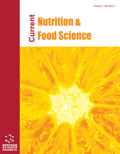
Current Nutrition & Food Science
Transforming insights into impactful nutritional solutions.Current Nutrition & Food Science is a prominent journal in the fields of Food Science, Nutrition, and Dietetics, published by Bentham Science Publishers Ltd. Based in the United Arab Emirates, the journal has been a significant resource since its inception in 2006, and is expected to continue contributing valuable insights through 2024. With an impressive impact factor and a comprehensive scope that examines the intersection of nutrition, food science, and public health, it operates within Category Quartiles reflecting its standing, with rankings in Q3 for Food Science and Nutrition, and Q4 for Public Health. Despite its challenges in visibility as indicated by current Scopus rankings, the journal remains a critical platform for ongoing research and discussions in the realm of nutritional science. Researchers, professionals, and students alike will find that the journal's commitment to quality and relevance makes it an essential tool for advancing understanding and innovation in nutrition and food science.
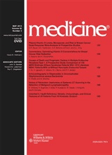
MEDICINE
Empowering global research in the heart of medicine.MEDICINE, published by Lippincott Williams & Wilkins, is an esteemed open access journal in the field of general medicine, holding a significant position with a Scopus rank of #190 out of 636 in its category (2023), placing it in the 70th percentile. Since its inception in 1922, MEDICINE has been a vital platform for researchers, professionals, and students to disseminate groundbreaking findings and advancements in the medical field. With the transition to open access in 2014, the journal ensures that valuable research is readily available to a global audience, fostering collaboration and innovation across diverse medical disciplines. Its current impact factor and influence in the miscellaneous medicine category (Q3) reflect its commitment to supporting rigorous peer-review processes and promoting scholarly excellence. Located in Philadelphia, PA, the journal covers a wide range of topics, making it a crucial resource for those dedicated to the betterment of healthcare and medical education.
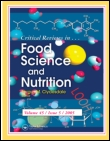
CRITICAL REVIEWS IN FOOD SCIENCE AND NUTRITION
Pioneering Research for Sustainable Food PracticesCRITICAL REVIEWS IN FOOD SCIENCE AND NUTRITION, published by Taylor & Francis Inc, is a premier peer-reviewed journal dedicated to advancing the understanding of food science and nutrition. With its ISSN 1040-8398 and E-ISSN 1549-7852, this influential journal has established itself as an essential resource in the field, featuring high-quality reviews and critical analyses that foster innovation and knowledge sharing among researchers, practitioners, and academics. Recognized as a Q1 journal in Food Science, Industrial and Manufacturing Engineering, and Medicine (miscellaneous) for 2023, it ranks impressively within the top percentiles of its respective fields, making it a valuable platform for impactful research. Although the journal does not currently offer open access, it continues to attract a readership eager to explore the intricacies of food science and its applications, thereby shaping future advancements in the industry. With an extensive history dating back to 1981 and convergence up to 2024, CRITICAL REVIEWS IN FOOD SCIENCE AND NUTRITION remains committed to providing comprehensive reviews that illuminate contemporary challenges and solutions in the domain of food science and nutrition.
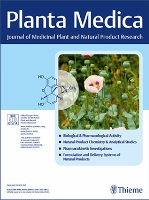
PLANTA MEDICA
Advancing the Science of Nature's RemediesPLANTA MEDICA is a premier journal dedicated to advancing the field of medicinal plant research, published by Georg Thieme Verlag KG in Germany. With an ISSN of 0032-0943 and an E-ISSN of 1439-0221, this journal has been a cornerstone of scholarly communication since its inception in 1961. Recognized for its rigorous peer-review process, PLANTA MEDICA holds a notable reputation in the academic landscape, featuring a 2023 Q2 ranking in categories such as Analytical Chemistry and Pharmaceutical Science, along with respectable Q3 rankings in Drug Discovery and Molecular Medicine. The journal focuses on the synthesis, pharmacological, and biochemical assessment of phytochemicals, making it an essential resource for researchers, professionals, and students alike who are engaged in the exploration of complementary and alternative medicine. Although it does not offer open access options, its content is instrumental in identifying new therapeutic agents derived from plants, thereby underscoring its importance in drug discovery and holistic health research.

Frontiers in Nutrition
Transforming research into practical nutrition solutions.Frontiers in Nutrition, published by FRONTIERS MEDIA SA, is a leading open access journal dedicated to advancing the field of nutrition through rigorous research and innovative insights. Since its inception in 2014, it has established itself as a key resource for researchers, healthcare professionals, and policymakers interested in the multidimensional aspects of nutrition and its impact on health and disease. The journal boasts a commendable reputation with a quartile ranking of Q1 in Food Science and multiple Q2 rankings in Endocrinology, Diabetes and Metabolism, as well as Nutrition and Dietetics, reflecting its high-quality contributions to the scientific community. With an accessible platform that ensures the wide dissemination of knowledge, Frontiers in Nutrition is committed to fostering collaboration among experts and promoting findings that can lead to healthier populations worldwide. The journal encourages submissions that address the complex interplay between nutrition and health, thus bridging the gap between research and practical application. Join us in exploring how nutrition can enhance well-being and address global health challenges.

Food Science and Human Wellness
Exploring Innovations in Food and HealthFood Science and Human Wellness, published by TSINGHUA UNIVERSITY PRESS, is an esteemed open-access journal that has been at the forefront of advancing research in the interdisciplinary fields of food science and human health since its inception in 2012. With an impressive impact factor indicative of its quality and relevance, this journal holds a prestigious Q1 ranking in Food Science according to 2023 metrics, reflecting its commitment to high-caliber research and innovation. The journal is positioned within the top 12% of its category, ranked 46th out of 389 in Agricultural and Biological Sciences. The journal not only publishes original research articles but also critical reviews, perspectives, and innovations that contribute significantly to our understanding of the relationship between nutrition, wellness, and food science. With its Open Access model, Food Science and Human Wellness ensures that its valuable content is available to a global audience, fostering collaborative advancements in this vital field. Researchers, professionals, and students are invited to explore insightful discussions and impactful studies that aim to enhance public health and food safety.

FOOD TECHNOLOGY
Pioneering Solutions for a Sustainable Food IndustryFOOD TECHNOLOGY, published by the Institute of Food Technologists, is a pivotal journal dedicated to the advancement of knowledge and innovation in the food industry. With its ISSN 0015-6639, this esteemed publication aims to bridge the gap between food science research and practical applications, addressing ongoing challenges and technological advancements in food production, preservation, and safety. Although currently not an open-access journal, FOOD TECHNOLOGY continues to serve as a critical resource for food scientists, engineers, and industry professionals seeking to stay at the forefront of emerging trends and research in the field. Recognized for its impact within the academic community, it holds a Q4 ranking in Chemistry, Food Science, and Industrial and Manufacturing Engineering categories, reflecting its importance in disseminating valuable information. Researchers and practitioners alike will find in its pages a wealth of insights that can influence practices and policies in food technology. The journal's editorial team, committed to upholding rigorous standards, ensures that each issue is a thorough representation of high-quality research and a valuable addition to the body of food science literature.

Nutrients
Fostering collaboration for impactful nutritional research.Nutrients is a premier, peer-reviewed open access journal published by MDPI, dedicated to advancing the field of nutrition and dietary research. Since its inception in 2009, this journal has consistently garnered acclaim, achieving a Q1 ranking in both Food Science and Nutrition and Dietetics, reflecting its significant impact in these vital areas of study. With a robust Scopus ranking of #40 out of 389 in Food Science and #18 out of 140 in Nutrition and Dietetics, Nutrients has established itself as a leading platform for researchers, practitioners, and students aiming to share and gain insights into nutritional epidemiology, dietary interventions, and policy implications. Hailing from Basel, Switzerland, the journal ensures broader accessibility through its open access model, inviting diverse contributions that enhance our understanding of nutrition in health and disease. By fostering collaboration across disciplines, Nutrients not only serves as a resource for high-quality research but also encourages innovation essential for tackling global nutritional challenges.
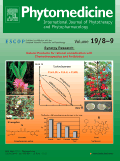
PHYTOMEDICINE
Empowering Health with Evidence-Based Plant ResearchPHYTOMEDICINE is a premier journal published by Elsevier GmbH, based in Germany, that serves as a central hub for the dissemination of innovative research in the fields of Complementary and Alternative Medicine, Drug Discovery, Molecular Medicine, Pharmaceutical Science, and Pharmacology. Established in 1994, this multidisciplinary journal has rapidly ascended to a Q1 ranking across these categories in 2023, highlighting its significance and impact within the scientific community. With its current Scopus rankings placing it in the top tiers—such as #3 in Complementary and Alternative Medicine and #17 in Pharmaceutical Science—PHYTOMEDICINE is recognized for its commitment to publishing high-quality, peer-reviewed articles that advance our understanding of phytotherapeutics and their applications. Researchers and professionals in the field benefit from its rigorous standards and comprehensive coverage, while students gain access to essential findings that shape contemporary practices in medicine and pharmacology. Its continued focus on critical advancements ensures that PHYTOMEDICINE remains a vital resource for anyone involved in the exploration of medicinal plants and their potential health benefits.

Journal of Food and Nutrition Research
Fostering Interdisciplinary Approaches to Food ScienceJournal of Food and Nutrition Research, published by the VUP FOOD RESEARCH INST in Bratislava, Slovakia, serves as a vital platform for disseminating cutting-edge research in the fields of food science and nutrition. With an ISSN of 1336-8672 and an E-ISSN of 1338-4260, this journal emphasizes the importance of interdisciplinary approaches to address contemporary challenges related to food quality, dietary practices, and nutritional health. Notably recognized in the 2023 Scopus rankings, the journal is classified in Q3 quartiles for both Food Science and Nutrition & Dietetics, providing a forum for researchers aiming to enhance knowledge and practices within these domains. Those engaged in academia and industry will find the journal invaluable for its comprehensive scope, which covers novel food technologies, nutrition interventions, and the implications of dietary behaviors. Though not open access, the journal is dedicated to enriching the academic conversation and contributing to advancements in public health and nutrition policies.